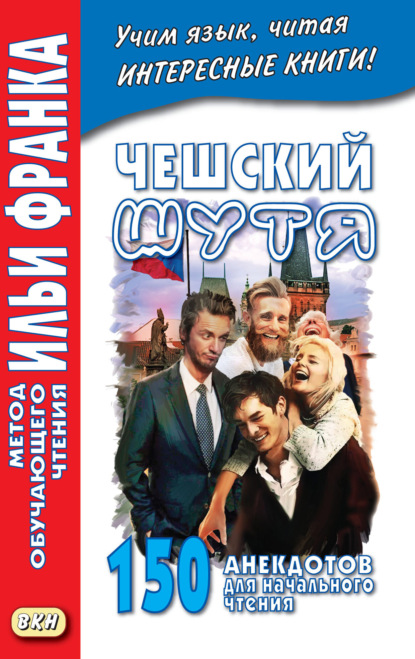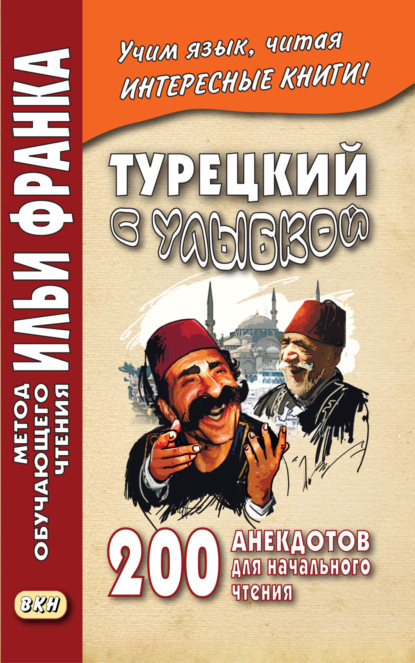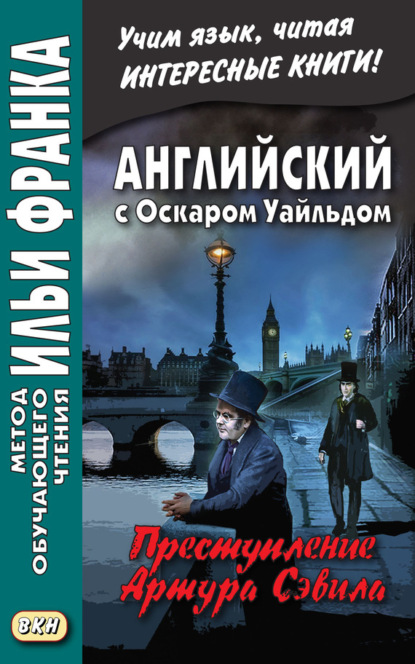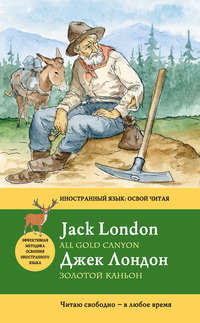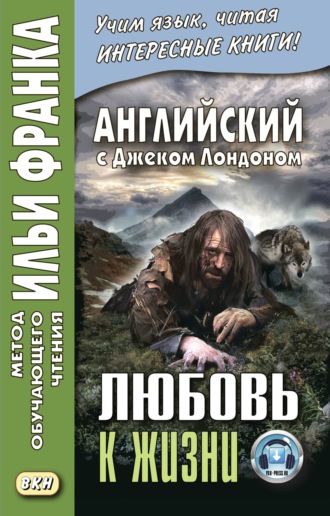
Полная версия
Английский с Джеком Лондоном. Любовь к жизни / Jack London. Love of Live
He cowered in the midst of the milky water, as though the vastness were pressing in upon him with overwhelming force, brutally crushing him with its complacent awfulness. He began to shake as with an ague-fit, till the gun fell from his hand with a splash. This served to rouse him. He fought with his fear and pulled himself together, groping in the water and recovering the weapon. He hitched his pack farther over on his left shoulder, so as to take a portion of its weight from off the injured ankle. Then he proceeded, slowly and carefully, wincing with pain, to the bank.
He did not stop (он не останавливался). With a desperation that was madness (с отчаянием, которое было безумием), unmindful of the pain (не обращая внимания на боль; unmindful – забывчивый, невнимательный; mind – разум; память), he hurried up the slope to the crest of the hill (он поспешил вверх по склону к гребню холма) over which his comrade had disappeared (за которым исчез его товарищ) – more grotesque and comical by far than that limping, jerking comrade (намного более нелепый и комичный, чем тот хромающий, двигающийся резкими толчками товарищ; to jerk – двигаться резкими толчками; дергаться). But at the crest he saw a shallow valley, empty of life (но на гребне он увидел плоскую долину, лишенную жизни; empty – пустой, полый; необитаемый, нежилой, незанятый, свободный). He fought with his fear again (он снова сразился со своим страхом = ему снова пришлось бороться со своим страхом; to fight), overcame it (преодолел его), hitched the pack still farther over on his left shoulder (переместил тюк еще дальше на левом плече), and lurched on down the slope (и пошел, шатаясь, дальше вниз по склону).
unmindful [ʌn’maɪndfʋl], comrade [‘kɒmreɪd], valley [‘vælɪ]He did not stop. With a desperation that was madness, unmindful of the pain, he hurried up the slope to the crest of the hill over which his comrade had disappeared – more grotesque and comical by far than that limping, jerking comrade. But at the crest he saw a shallow valley, empty of life. He fought with his fear again, overcame it, hitched the pack still farther over on his left shoulder, and lurched on down the slope.
The bottom of the valley was soggy with water (дно долины было болотистым от воды; soggy – промокший насквозь; пропитанный влагой; болотистый, топкий /о земле, грунте/), which the thick moss held, spongelike, close to the surface (которую удерживал густой мох, похожий на губку, расположенный близко к почве = росший у самой почвы; close – близко расположенный; sponge – губка; surface – поверхность). This water squirted out from under his feet at every step (эта вода била струей из-под его ног при каждом шаге; to squirt out – бить струей; squirt – струя), and each time he lifted a foot the action culminated in a sucking sound (и каждый раз, как он поднимал ногу, действие венчал чмокающий звук; sucking – всасывающий, сосущий; to suck – сосать; to culminate – достигнуть высшей точки, кульминации, апогея; венчать, завершать, стать завершением) as the wet moss reluctantly released its grip (когда мокрый мох неохотно разжимал свою хватку; to release – освобождать; отпускать, выпускать, пускать). He picked his way from muskeg to muskeg (он осторожно продвигался от трясины к трясине; to pick one’s way – выбирать дорогу, продвигаться вперед с большой осторожностью), and followed the other man’s footsteps along and across the rocky ledges (и шел по шагам другого мужчины вдоль скалистых выступов и через них; to follow – следовать, идти за) which thrust like islets through the sea of moss (которые раскинулись, как островки, по морю мха; to thrust – колоть; совать; развертывать/ся/, раскидывать/ся/, простирать/ся/, протягивать/ся/).
surface [‘sǝ:fɪs], every [‘evrɪ], islet [‘aɪlɪt]The bottom of the valley was soggy with water, which the thick moss held, spongelike, close to the surface. This water squirted out from under his feet at every step, and each time he lifted a foot the action culminated in a sucking sound as the wet moss reluctantly released its grip. He picked his way from muskeg to muskeg, and followed the other man’s footsteps along and across the rocky ledges which thrust like islets through the sea of moss.
Though alone, he was not lost (хоть и один, он не заблудился; to lose – терять; проигрывать; lost – потерянный, заблудившийся). Farther on he knew he would come to where dead spruce and fir, very small and weazened (дальше, он знал, он придет к тому месту, где мертвые ели и пихты, очень маленькие и высохшие), bordered the shore of a little lake, the titchin-nichilie (окаймляют берег небольшого озера «тичин-ничили»), in the tongue of the country, the “land of little sticks (на языке этой местности «земля прутиков»; stick – палка, прут).” And into that lake flowed a small stream (а в то озеро впадала маленькая речушка), the water of which was not milky (вода которой не была молочно-мутной). There was rush-grass on that stream (на той речке был = рос тростник) – this he remembered well (это он помнил хорошо) – but no timber (но никакого леса; timber – лесоматериалы; строевой лес; древесина), and he would follow it till its first trickle ceased at a divide (и он будет идти по ней, пока ее первая струйка не закончится на водоразделе; to cease – переставать /делать что-либо/, прекращать/ся/). He would cross this divide to the first trickle of another stream (он перейдет этот водораздел до первой струйки другого потока), flowing to the west (текущего на запад), which he would follow (за которым он будет идти) until it emptied into the river Dease (пока тот не впадет в реку Диз), and here he would find a cache under an upturned canoe and piled over with many rocks (и здесь он найдет /тайный/ запас = припасы под перевернутым каноэ и заваленный большим количеством камней; to pile over – заваливать, наваливать; pile – куча, груда). And in this cache would be ammunition for his empty gun (а в этом запасе будут боеприпасы для его пустого ружья), fish-hooks and lines, a small net (рыболовные крючки и лески, небольшая сеть) – all the utilities for the killing and snaring of food (все полезные вещи для убийства и ловли еды; snare – западня, капкан, ловушка, силок; to snare – поймать в ловушку, силки /птицу, небольшого зверька/). Also, he would find flour (также он найдет муку), – not much (немного), – a piece of bacon, and some beans (кусок бекона и немного бобов).
cease [si:s], cache [kæʃ], flour [‘flaʋǝ]Though alone, he was not lost. Farther on he knew he would come to where dead spruce and fir, very small and weazened, bordered the shore of a little lake, the titchin-nichilie, in the tongue of the country, the “land of little sticks.” And into that lake flowed a small stream, the water of which was not milky. There was rush-grass on that stream – this he remembered well – but no timber, and he would follow it till its first trickle ceased at a divide. He would cross this divide to the first trickle of another stream, flowing to the west, which he would follow until it emptied into the river Dease, and here he would find a cache under an upturned canoe and piled over with many rocks. And in this cache would be ammunition for his empty gun, fish-hooks and lines, a small net – all the utilities for the killing and snaring of food. Also, he would find flour, – not much, – a piece of bacon, and some beans.
Bill would be waiting for him there (Билл будет ждать его там), and they would paddle away south down the Dease to the Great Bear Lake (и они уплывут на лодке на юг вниз по течению Диз к Большому Медвежьему озеру). And south across the lake they would go (и они поплывут на юг через озеро), ever south (все время на юг), till they gained the Mackenzie (пока не доберутся до Макензи). And south, still south, they would go (и они будут двигаться на юг, все еще на юг), while the winter raced vainly after them (в то время как зима будет напрасно гнаться за ними; to race – состязаться в скорости, пускаться наперегонки; мчаться, нестись, лететь), and the ice formed in the eddies (а лед будет образовываться в заводях), and the days grew chill and crisp (и дни будут становиться холодными и морозными; to grow – расти; становиться; crisp – завитой, кудрявый; жесткий; свежий, бодрящий, живительный; морозный), south to some warm Hudson Bay Company post (на юг к какому-нибудь теплому торговому посту компании «Гудзонов залив»), where timber grew tall and generous and there was grub without end (где лес рос высокий и обильный, и была бесконечная жратва = и было неограниченное количество жратвы; without end – бесконечный, бесконечно: «без конца»).
great [ɡreɪt], warm [wɔ:m], generous [‘ʤenerǝs]Bill would be waiting for him there, and they would paddle away south down the Dease to the Great Bear Lake. And south across the lake they would go, ever south, till they gained the Mackenzie. And south, still south, they would go, while the winter raced vainly after them, and the ice formed in the eddies, and the days grew chill and crisp, south to some warm Hudson Bay Company post, where timber grew tall and generous and there was grub without end.
These were the thoughts of the man as he strove onward (эти = такими были мысли человека, в то время как он стремился вперед; to strive – стараться, стремиться; бороться, прилагать усилия). But hard as he strove with his body (но как упорно он ни боролся со своим телом), he strove equally hard with his mind (он так же упорно боролся со своим разумом), trying to think that Bill had not deserted him (стараясь думать, что Билл не бросил его; to desert – покидать /территорию или человека/, оставлять; бросать /например, семью/), that Bill would surely wait for him at the cache (что Билл обязательно будет ждать его у тайника). He was compelled to think this thought (он был вынужден думать эту мысль = думать так), or else there would not be any use to strive (иначе не было никакого смысла бороться/стремиться), and he would have lain down and died (и он бы лег и умер). And as the dim ball of the sun sank slowly into the northwest (и когда неяркий шар солнца медленно опустился на северо-западе) he covered every inch (он прошел каждый дюйм; to cover – покрывать; охватывать) – and many times (и много раз) – of his and Bill’s flight south before the downcoming winter (своего бегства и /бегства/ Билла на юг перед надвигающейся зимой/от надвигающейся зимы; flight – бегство, поспешное отступление; to come down – спускаться, опускаться; падать /о снеге, дожде/, спускаться /о тумане/; downcoming – падающий, нисходящий; downcome – сильный и внезапный снегопад, ливень). And he conned the grub of the cache and the grub of the Hudson Bay Company post over and over again (и он снова и снова перебирал /в памяти/ детально жратву тайника и жратву на посту компании «Гудзонов залив»; to con – учить наизусть, зубрить; детально изучать что-либо; grub – /сленг/ жратва, жрачка, хавка; grub – личинка /особ. жука/; червь). He had not eaten for two days (он не ел уже два дня); for a far longer time he had not had all he wanted to eat (гораздо дольше он не ел всего того, что он хотел поесть). Often he stooped and picked pale muskeg berries (часто он нагибался и срывал бледные болотные ягоды), put them into his mouth (клал их в рот), and chewed and swallowed them (жевал и проглатывал их). A muskeg berry is a bit of seed enclosed in a bit of water (болотная ягода – это немножко семени, замкнутое в немножко = в небольшом количестве воды). In the mouth the water melts away and the seed chews sharp and bitter (во рту вода тает, а семя жуется /и оказывается на вкус/ острым и горьким; sharp – острый /о предмете/; едкий, острый /о вкусе/). The man knew there was no nourishment in the berries (человек знал, что в ягодах нет ничего питательного; nourishment – кормление, питание; пища; еда, корм, поддержка; to nourish – кормить, питать), but he chewed them patiently with a hope greater than knowledge and defying experience (но он жевал их терпеливо с надеждой большей, чем знание, и бросая вызов опыту; to defy – вызывать, бросать вызов; манкировать, игнорировать).
surely [‘ʃʋǝlɪ], chew [ʧu:], knowledge [‘nɒlɪʤ]These were the thoughts of the man as he strove onward. But hard as he strove with his body, he strove equally hard with his mind, trying to think that Bill had not deserted him, that Bill would surely wait for him at the cache. He was compelled to think this thought, or else there would not be any use to strive, and he would have lain down and died. And as the dim ball of the sun sank slowly into the northwest he covered every inch – and many times – of his and Bill’s flight south before the downcoming winter. And he conned the grub of the cache and the grub of the Hudson Bay Company post over and over again. He had not eaten for two days; for a far longer time he had not had all he wanted to eat. Often he stooped and picked pale muskeg berries, put them into his mouth, and chewed and swallowed them. A muskeg berry is a bit of seed enclosed in a bit of water. In the mouth the water melts away and the seed chews sharp and bitter. The man knew there was no nourishment in the berries, but he chewed them patiently with a hope greater than knowledge and defying experience.
At nine o’clock he stubbed his toe on a rocky ledge (в девять часов он ударился пальцем ноги о скалистый уступ; to stub – ударяться ногой обо что-либо твердое; stub – пень), and from sheer weariness and weakness staggered and fell (и от полнейшей усталости и слабости зашатался и упал; weary – усталый, изнуренный, утомленный; weak – слабый). He lay for some time (он полежал некоторое время), without movement, on his side (неподвижно: «без движения» на боку). Then he slipped out of the pack-straps and clumsily dragged himself into a sitting posture (затем он выскользнул из вьючных ремней и неповоротливо перетащил себя в сидячее положение; clumsy – неловкий; неповоротливый, нескладный). It was not yet dark (было еще не темно), and in the lingering twilight he groped about among the rocks for shreds of dry moss (и в затянувшихся сумерках он пошарил среди скал в поисках кусочков сухого мха; to linger – засиживаться, задерживаться; тянуться, затягиваться /о каких-либо действиях/). When he had gathered a heap he built a fire (когда он собрал кучу, он развел костер; to build – строить; разводить /о костре/), – a smouldering, smudgy fire (тлеющий, дымящий костер; smudgy – грязный, чумазый; запачканный, перепачканный; дымный, дымящий; smudge – грязное пятно, грязь), – and put a tin pot of water on to boil (и поставил вскипятить оловянный котелок воды).
weariness [‘wɪǝrɪnɪs], movement [‘mu:vmǝnt], twilight [‘twaɪlaɪt]At nine o’clock he stubbed his toe on a rocky ledge, and from sheer weariness and weakness staggered and fell. He lay for some time, without movement, on his side. Then he slipped out of the pack-straps and clumsily dragged himself into a sitting posture. It was not yet dark, and in the lingering twilight he groped about among the rocks for shreds of dry moss. When he had gathered a heap he built a fire, – a smouldering, smudgy fire, – and put a tin pot of water on to boil.
He unwrapped his pack (он развернул свой вьюк; to wrap – завертывать, сворачивать) and the first thing he did was to count his matches (и первым, что он сделал, – посчитал свои спички). There were sixty-seven (/их/ было шестьдесят семь). He counted them three times to make sure (он посчитал их три раза, чтобы удостовериться; to make sure – убеждаться; удостовериться; на всякий случай; sure – уверенный; надежный). He divided them into several portions (он разделил их на несколько частей), wrapping them in oil paper (завернув их в промасленную бумагу; oil – растительное масло), disposing of one bunch in his empty tobacco pouch (разместив одну связку в своем пустом кисете; to dispose – размещать, располагать), of another bunch in the inside band of his battered hat (другую порцию во внутренней ленте своей потрепанной шапки), of a third bunch under his shirt on the chest (третью связку под рубахой на груди). This accomplished, a panic came upon him (когда это было завершено, его охватила паника; to come on – обрушиться, навалиться на кого-либо /о чем-либо нежелательном, неблагоприятном/), and he unwrapped them all and counted them again (и он развернул их все и пересчитал их опять). There were still sixty-seven (/их/ было все еще шестьдесят семь).
count [kaʋnt], wrap [ræp], pouch [paʋʧ]He unwrapped his pack and the first thing he did was to count his matches. There were sixty-seven. He counted them three times to make sure. He divided them into several portions, wrapping them in oil paper, disposing of one bunch in his empty tobacco pouch, of another bunch in the inside band of his battered hat, of a third bunch under his shirt on the chest. This accomplished, a panic came upon him, and he unwrapped them all and counted them again. There were still sixty-seven.
He dried his wet foot-gear by the fire (он просушил свою мокрую обувь у огня). The moccasins were in soggy shreds (мокасины были промокшими клочьями). The blanket socks were worn through in places (шерстяные носки были изношены насквозь = до дыр в некоторых местах; to wear – носить /одежду, прическу, украшения и т. п./; снашивать/ся/), and his feet were raw and bleeding (а его ступни были ободранными и кровоточащими; raw – сырой, недоваренный; недожаренный /о пище, еде/; ободранный, лишенный кожи, кровоточащий /о ране, коже/). His ankle was throbbing (его лодыжка пульсировала), and he gave it an examination (и он осмотрел ее; to give an examination – делать осмотр, осматривать). It had swollen to the size of his knee (она распухла до размера колена; to swell – набухать, разбухать, опухать). He tore a long strip from one of his two blankets and bound the ankle tightly (он оторвал длинную полоску от одного из своих двух одеял и туго перевязал лодыжку; to tear – рвать, отрывать). He tore other strips and bound them about his feet to serve for both moccasins and socks (он оторвал другие полоски = нарвал еще полосок и перевязал ими ноги, чтобы они /полоски/ служили как мокасинами, так и носками). Then he drank the pot of water, steaming hot (затем он выпил котелок воды, горячей с паром; steam – пар; to steam – выпускать пар; парить, подниматься в виде пара), wound his watch (завел часы; to wind – наматывать/ся/; обматывать/ся/, обвивать/ся/; мотать; заводить /часы/), and crawled between his blankets (и заполз между одеял).
He slept like a dead man (он спал, как мертвый). The brief darkness around midnight came and went (недолгая тьма около полуночи пришла и ушла; brief – короткий, недолгий). The sun arose in the northeast (солнце поднялось на северо-востоке) – at least the day dawned in that quarter (по крайней мере, в этой четверти зарождался день; to dawn – /рас/светать, зачинаться /о рассвете/; начинаться; проявляться; зарождаться), for the sun was hidden by gray clouds (ибо солнце было скрыто серыми тучами; to hide – прятать, скрывать).
fire [‘faɪǝ], raw [rɔ:], wound [waʋnd], crawl [krɔ:l]He dried his wet foot-gear by the fire. The moccasins were in soggy shreds. The blanket socks were worn through in places, and his feet were raw and bleeding. His ankle was throbbing, and he gave it an examination. It had swollen to the size of his knee. He tore a long strip from one of his two blankets and bound the ankle tightly. He tore other strips and bound them about his feet to serve for both moccasins and socks. Then he drank the pot of water, steaming hot, wound his watch, and crawled between his blankets.
He slept like a dead man. The brief darkness around midnight came and went. The sun arose in the northeast – at least the day dawned in that quarter, for the sun was hidden by gray clouds.
At six o’clock he awoke (в шесть часов он проснулся; to awake – просыпаться, очнуться от сна), quietly lying on his back (неподвижно лежа на спине; quietly – спокойно, тихо, бесшумно; не двигаясь). He gazed straight up into the gray sky (он пристально вгляделся прямо в серое небо) and knew that he was hungry (и понял, что он голоден). As he rolled over on his elbow he was startled by a loud snort (когда он перекатился на локоть, его испугало громкое фырканье), and saw a bull caribou regarding him with alert curiosity (и /он/ увидел самца карибу, разглядывавшего его с настороженным любопытством). The animal was not more than fifty feet away (животное было не более, чем в пятидесяти футах от него; away – прочь, вдали), and instantly into the man’s mind leaped the vision and the savor of a caribou steak sizzling and frying over a fire (и тотчас в уме человека выросло видение и вкус бифштекса из карибу, шипящего и поджаривающегося над костром; savor – особый вкус или запах /чего-либо/; to leap – прыгать, скакать). Mechanically he reached for the empty gun (механически он потянулся за пустым = незаряженным ружьем), drew a bead, and pulled the trigger (прицелился и спустил курок; to draw a bead – прицеливаться; bead – мушка, прицел; to pull the trigger – спустить курок). The bull snorted and leaped away (олень фыркнул и ускакал), his hoofs rattling and clattering as he fled across the ledges (при этом его копыта гремели и цокали, когда он убегал по уступам /скал/; to flee – убегать, спасаться бегством).
bull [bʋl], curiosity [,kjʋǝrɪ’ɒsɪtɪ], steak [steɪk]At six o’clock he awoke, quietly lying on his back. He gazed straight up into the gray sky and knew that he was hungry. As he rolled over on his elbow he was startled by a loud snort, and saw a bull caribou regarding him with alert curiosity. The animal was not more than fifty feet away, and instantly into the man’s mind leaped the vision and the savor of a caribou steak sizzling and frying over a fire. Mechanically he reached for the empty gun, drew a bead, and pulled the trigger. The bull snorted and leaped away, his hoofs rattling and clattering as he fled across the ledges.


